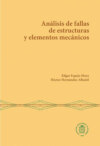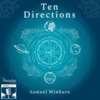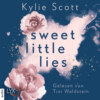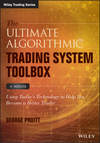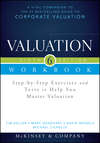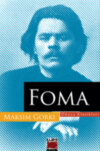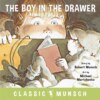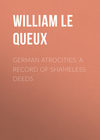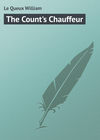Kitabı oku: «Mademoiselle of Monte Carlo», sayfa 11
“Ah! my darling, these are, indeed, moments of supreme happiness,” Hugh exclaimed as he held her tightly in his arms. “I wonder when we dare meet again?”
“Soon, dear—very soon, I hope. Let us make another appointment,” she said. “On Friday week mother is going to spend the night with Mrs. Deane down at Ascot. I shall make excuse to stay at home.”
“Right. Friday week at the same place and time,” he said cheerily.
“I’ll have to go now,” she said regretfully. “I only wish I could stay longer, but I must get back at once. If mother misses me she’ll have a fit.”
So he walked with her out of the Victoria Gate into the Bayswater Road and put her into an empty taxi which was passing back to Oxford Street.
Then, when he had pressed her hand and wished her adieu, he continued, towards Notting Hill Gate, and thence returned to Kensington.
But, though he was ignorant of the fact, the rather lank figure which had been waiting outside the house in Grosvenor Gardens now followed him almost as noiselessly as a shadow. Never once did the watcher lose sight of him until he saw him enter the house in Abingdon Road with his latchkey.
Then, when the door had closed, the mysterious watcher passed by and scrutinized the number, after which he hastened back to Kensington High Street, where he found a belated taxi in which he drove away.
SEVENTEENTH CHAPTER
ON THE SURREY HILLS
On the following morning, about twelve o’clock, Emily, Mrs. Mason’s stout maid-of-all-work, showed a tall, well-dressed man into Hugh’s frowsy little sitting-room where he sat reading.
He sprang to his feet when he recognized his visitor to be Charles Benton.
“Well my boy!” cried his visitor cheerily. “So I’ve found you at last! We all thought you were on the Continent, lying low somewhere.”
“So I have been,” replied the young man faintly. “You’ve heard of that affair at Monte Carlo?”
“Of course. And you are suspected—wanted by the police? That’s why I’m here,” Benton replied. “This place isn’t safe for you. You must get away from it at once,” he added, lowering his voice.
“Why isn’t it safe?”
“Because at Scotland Yard they know you are somewhere in Kensington, and they’re hunting high and low for you.”
“How do you know?”
“Because Harpur, one of the assistant Commissioners of Police, happened to be in the club yesterday, and we chatted. So I pumped him as to the suspected person from Monte Carlo, and he declared that you were known to be in this district, and your arrest was only a matter of time. So you must clear out at once.”
“Where to?” asked Hugh blankly.
“Well, there’s a lady you met once or twice with me, Mrs. Bond. She will be delighted to put you up for a few weeks. She has a charming house down in Surrey—a place called Shapley Manor.”
“She might learn the truth and give me away,” remarked Hugh dubiously.
“She won’t. Recollect, Hugh, that I was your father’s friend, and am yours. What advice I give you is for your own good. You can’t stay here—it’s impossible.”
The name of The Sparrow was upon Hugh’s lips, and he was about to tell Benton of that mysterious person’s efforts on his behalf, but, on reflection, he saw that he had no right to expose The Sparrow’s existence to others. The very house in which they were was one of the bolt-holes of the wonderfully organized gang of crooks which Il Passero controlled.
“How did you know that I was here?” asked Hugh suddenly in curiosity.
“That I’m not at liberty to say. It was not a friend of yours, but rather an enemy who told me—hence I tell you that you run the gravest risk in remaining here a moment longer. As soon as I heard you were here, I telephoned to Mrs. Bond, and she has very generously asked us both to stay with her,” Benton went on. “If you agree, I’ll get a car now, without delay, and we’ll run down into Surrey together,” he added.
Hugh glanced at the tall, well-dressed man of whom his father had thought so highly. Charles Benton, in spite of his hair tuning grey, was a handsome man, and moved in a very good circle of society. Nobody knew his source of income, and nobody cared. In these days clothes make the gentleman, and a knighthood a lady.
Like many others, old Mr. Henfrey had been sadly deceived by Charles Benton, and had taken him into his family as a friend. Other men had done the same. His geniality, his handsome, open face, and his plausible manner, proved the open sesame to many doors of the wealthy, and the latter were robbed in various ways, yet never dreaming that Benton was the instigator of it all. He never committed a theft himself. He gave the information—and others did the dirty work.
“You recollect Mrs. Bond,” said Benton. “But I believe Maxwell, her first husband, was alive then, wasn’t he?”
“I have a faint recollection of meeting a Mrs. Maxwell in Paris—at lunch at the Pre Catalan—was it not?”
“Yes, of course. About six years ago. That’s quite right!” laughed Benton. “Well, Maxwell died and she married again—a Colonel Bond. He was killed in Mesopotamia, and now she’s living up on the Hog’s Back, beyond Guildford, on the road to Farnham.”
Hugh again reflected. He had come to Abingdon Road at the suggestion of the mysterious White Cavalier. Ought he to leave the place without first consulting him? Yet he had no knowledge of the whereabouts of the man of mystery whom he firmly believed was none other than the elusive Sparrow. Besides, was not Benton, his father’s closest friend, warning him of his peril?
The latter thought decided him.
“I’m sure it’s awfully good of Mrs. Bond whom I know so slightly to invite me to stay with her.”
“Nothing, my dear boy. She’s a very old friend of mine. I once did her a rather good turn when Maxwell was alive, and she’s never forgotten it. She’s one of the best women in the world, I assure you,” Benton declared. “I’ll run along to a garage I know in Knightsbridge and get a car to take us down to Shapley. It’s right out in the country, and as long as you keep clear of the town of Guildford—where the police are unusually wary under one of the shrewdest chief constables in England—then you needn’t have much fear. Pack up your traps, Hugh, and I’ll call for you at the end of the road in half an hour.”
“Yes. But I’ll want a dress suit and lots of other things if I’m going to stay at a country house,” the young man demurred.
“Rot! You can get all you want in Aldershot, Farnham or Portsmouth. Come just as you are. Mrs. Bond will make all allowances.”
“And probably have her suspicions aroused at the same time?”
“No, she won’t. This is a sudden trip into the country. I told her you had been taken unwell—a nervous breakdown—and that the doctor had ordered you complete rest at once.”
“I wish I had stayed in Monte Carlo and faced the charge against me,” declared Hugh fervently. “Being hunted from pillar to post like this is so absolutely nerve-racking.”
“Why did you go to that woman’s house, Hugh?” Benton asked. “What business had you that led you to call at that hour upon such a notorious person?”
Hugh remained silent. He saw that to tell Benton the truth would be to reopen the whole question of the will and of Louise.
So he merely shrugged his shoulders.
“Won’t you tell me what really happened at the Villa Amette, Hugh?” asked the elder man persuasively. “I’ve seen Brock, but he apparently knows nothing.”
“Of course he does not. I was alone,” was Hugh’s answer. “The least said about that night of horror the better, Benton.”
So his father’s friend left the house, while Hugh sought Mrs. Mason, settled his bill with her, packed his meagre wardrobe into a suit-case, and half an hour later entered the heavy old limousine which he found at the end of the road.
They took the main Portsmouth road, by way of Kingston, Cobham and Ripley, until in the cold grey afternoon they descended the steep hill through Guildford High Street, and crossing the bridge, instead of continuing along the road to Portsmouth, bore to the right, past the station, and up the steep wide road over that long hill, the Hog’s Back, whence a great misty panorama was spread out on either side of the long, high-up ridge which in the sunshine gives such a wonderful view to motorists on their way out of London southward.
Presently the car turned into the gravelled drive, and Hugh found himself at Shapley.
In the chintz-hung, old-world morning-room, lit by the last rays of the declining sun, for the sky had suddenly cleared, Mrs. Bond entered, loud-voiced and merry.
“Why, Mr. Henfrey! I’m so awfully pleased to see you. Charles telephoned to me that you were a bit out of sorts. So you must stay with me for a little while—both of you. It’s very healthy up here on the Surrey hills, and you’ll soon be quite right again.”
“I’m sure, Mrs. Bond, it is most hospitable of you,” Hugh said. “London in these after the war days is quite impossible. I always long for the country. Certainly your house is delightful,” he added, looking round.
“It’s one of the nicest houses in the whole county of Surrey, my boy,” Benton declared enthusiastically. “Mrs. Bond was awfully lucky in securing it. The family are unfortunately ruined, as so many others are by excessive taxation and high prices, and she just stepped in at the psychological moment.”
“Well, I really don’t know how to thank you sufficiently, Mrs. Bond,” Hugh declared. “It is really extremely good of you.”
“Remember, Mr. Henfrey, we are not strangers,” exclaimed the handsome woman. “Do you recollect when we met in Paris, and afterwards in Biarritz, and then that night at the Carlton?”
“I recollect perfectly well. We met before the war, when one could really enjoy oneself contentedly.”
“Since then I have been travelling a great deal,” said the woman. “I’ve been in Italy, the South of Spain, the Azores, and over to the States. I got back only a few months ago.”
And so after a chat Hugh was shown to his room, a pretty apartment, from the diamond-paned windows of which spread out a lovely view across to Godalming and Hindhead, with the South Downs in the blue far away.
“Now you must make yourselves at home, both of you,” the handsome woman urged as they came down into the drawing-room after a wash.
Tea was served, and over it much chatter about people and places. Mrs. Bond was, like her friend Benton, a thorough-going cosmopolitan. Hugh had no idea of her real reputation, or of her remarkable adventures. Neither had he any idea that Molly Maxwell was wanted by the Paris Surete, just as he himself was wanted.
“Isn’t this a charming place?” remarked Benton as, an hour later, they strolled on the long terrace smoking cigarettes before dinner. “Mrs. Bond was indeed fortunate in finding it.”
“Beautiful!” declared Hugh in genuine admiration. Since that memorable night in Monte Carlo he had been living in frowsy surroundings, concealed in thieves’ hiding-places, eating coarse food, and hearing the slang of the underworld of Europe.
It had been exciting, yet he had been drawn into it against his will—just because he had feared for Dorise’s sake, to face the music after that mysterious shot had been fired at the Villa Amette.
Mrs. Bond was most courteous to her guests, and as Hugh and Benton strolled up and down the terrace in the fast growing darkness, the elder man remarked:
“You’ll be quite safe here, you know, Hugh. Don’t worry. I’m truly sorry that you have landed yourself into this hole, but—well, for the life of me I can’t see what led you to seek out that woman, Yvonne Ferad. Why ever did you go there?”
Hugh paused.
“I—I had reasons—private reasons of my own,” he replied.
“That’s vague enough. We all have private reasons for doing silly things, and it seems that you did an exceptionally silly thing. I hear that Mademoiselle of Monte Carlo, after the doctors operated upon her brain, has now become a hopeless idiot.”
“So I’ve been told. It is all so very sad—so horrible. Though people have denounced her as an adventuress, yet I know that at heart she is a real good woman.”
“Is she? How do you know?” asked Benton quickly, for instantly he was on the alert.
“I know. And that is all.”
“But tell me, Hugh—tell me in confidence, my boy—what led you to seek her that night. You must have followed her from the Casino and have seen her enter the Villa. Then you rang at the door and asked to see her?”
“Yes, I did.”
“Why?”
“I had my own reasons.”
“Can’t you tell them to me, Hugh?” asked the tall man in a strange, low voice. “Remember, I am an old friend of your father. And I am still your best friend.”
Hugh pursued his walk in silence.
“No,” he said at last, “I prefer not to discuss the affair. That night is one full of painful memories.”
“Very well,” answered Benton shortly. “If you don’t want to tell me, Hugh, I quite understand. That’s enough. Have another cigarette,” and he handed the young fellow his heavy gold case.
A week passed. Hugh Henfrey and Charles Benton greatly enjoyed their stay at Shapley Manor. With their hostess they motored almost daily to many points of interest in the neighbourhood, never, by the way, descending into the town of Guildford, where the police were so unusually alert and shrewd.
More than once when alone with Benton, Hugh felt impelled to refer to the mysterious death of his father, but it was a very painful subject. The last time Hugh had referred to it, about a month before his visit to Monte Carlo, Benton had been greatly upset, and had begged the young man not to mention the tragic affair.
Constantly, however, Benton, on his part, would put cunning questions to him concerning Yvonne Ferad, as to what he knew concerning her, and how he had managed to escape over the frontier into Italy.
Late one night as they sat together in the billiard-room after their final game, Benton, removing the cigar from his lips, exclaimed:
“Oh! I quite forgot to tell you, Mrs. Bond has been awfully good to Louise. She took her from Paris with her and they went quite a long tour, first to Spain and other places, and then to New York and back.”
“Has she?” exclaimed Hugh in surprise. Only once before had Benton mentioned Louise’s name, then he had casually remarked that she was on a visit to some friends in Yorkshire.
“Yes. She’s making her home with Mrs. Bond for the present. She returns here to-morrow.”
As he said this, he watched the young man’s face. It was sphinx-like.
“Oh! That’s jolly!” he replied, with well assumed satisfaction. “It seems such an age since we last met—nearly a year before my father’s death, I believe.”
In his heart he had no great liking for the girl, although she was bright, vivacious and extremely good company.
Next afternoon the pair met in the hall after the car had brought her from Guildford station.
“Hallo, Hugh!” she cried as she grasped his hand. “Uncle wrote and told me you were here! How jolly, isn’t it? Why—you seem to have grown older,” she laughed.
“And you younger,” he replied, bending over her hand gallantly. “I hear you’ve been all over the world of late!”
“Yes. Wasn’t it awfully good of Mrs. Bond? I had a ripping time. I enjoyed New York ever so much. I find this place a bit dull after Paris though, so I’m often away with friends.”
And he followed her into the big morning-room where Mrs. Bond, alias Molly Maxwell, was awaiting her.
That afternoon there had been several callers; a retired admiral and his wife, and two county magistrates with their womenfolk, for since her residence at Shapley Mrs. Bond had been received in a good many smart houses, especially by the nouveau riche who abound in that neighbourhood. But the callers had left and they were now alone.
As Louise sat opposite the woman who had taken her under her charge, Hugh gazed at her furtively and saw that there was no comparison between her and the girl he loved so deeply.
How strange it was, he thought. If he asked her to be his wife and they married, he would at once become a wealthy man and inherit all his father’s possessions. True, she was very sweet and possessed more than the ordinary chic and good taste in dress. Yet he felt that he could never fulfil his dead father’s curious desire.
He could never marry her—never!
EIGHTEENTH CHAPTER
THE MAN WITH THE BLACK GLOVE
On his way out of London, Hugh had made excuse and stopped the car at a post office in Putney, whence he sent an express note to Dorise, telling her his change of address. He though it wiser not to post it.
Hence it was on the morning following Louise’s arrival at Shapley, he received a letter from Dorise, enclosing one she had received under cover for him. He had told Dorise to address him as “Mr. Carlton Symes.”
It was on dark-blue paper, such as is usually associated with the law or officialdom. Written in a neat, educated hand, it read:
“DEAR MR. HENFREY,—I hear that you have left Abingdon Road, and am greatly interested to know the reason. You will, no doubt, recognize me as the friend who sent a car for you at Monte Carlo. Please call at the above address at the earliest possible moment. Be careful that you are not watched. Say nothing to anybody, wherever you may be. Better call about ten-thirty P.M., and ask for me. Have no fear. I am still your friend,
“GEORGE PETERS.”
The address given was 14, Ellerston Street, Mayfair.
Hugh knew the street, which turned off Curzon Street, a short thoroughfare, but very exclusive. Some smart society folk lived there.
But who was George Peters? Was it not The Sparrow who had sent him the car with the facetious chauffeur to that spot in Monte Carlo? Perhaps the writer was the White Cavalier!
During the morning Hugh strolled down the hill and through the woods with Louise. The latter was dressed in a neat country kit, a tweed suit, a suede tam-o’-shanter, and carried a stout ash-plant as a walking-stick. They were out together until luncheon time.
Meanwhile, Benton sat with his hostess, and had a long confidential chat.
“You see, Molly,” he said, as he smoked lazily, “I thought it an excellent plan to bring them together, and to let them have an opportunity of really knowing each other. It’s no doubt true that he’s over head and ears in love with the Ranscomb girl, but Lady Ranscomb has set her mind on having Sherrard as her son-in-law. She’s a clever woman, Lady Ranscomb, and of course, in her eyes, Hugh is for ever beneath a cloud. That he went to the woman’s house at night is quite sufficient.”
“Well, if I know anything of young men, Charles, I don’t think you’ll ever induce that boy to marry Louise,” remarked the handsome adventuress whom nobody suspected.
“Then if he doesn’t, we’ll just turn him over to Scotland Yard. We haven’t any further use for him,” said Benton savagely. “It’s the money we want.”
“And I fear we shall go on wanting it, my dear Charles,” declared the woman, who was so well versed in the ways of men. “Louise likes him. She has told me so. But he only tolerates her—that’s all! He’s obsessed by the mystery of old Henfrey’s death.”
“I wonder if that was the reason he went that night to see Yvonne?” exclaimed Benton in a changed voice, as the idea suddenly occurred to him. “I wonder if—if he suspected something, and went boldly and asked her?”
“Ah! I wonder!” echoed the woman. “But Yvonne would surely tell him nothing. It would implicate her far too deeply if she did. Yvonne is a very shrewd person. She isn’t likely to have told the old man’s son very much.”
“No, you’re right, Molly,” replied the man. “You’re quite right! I don’t think we have much to fear on that score. We’ve got Hugh with us, and if he again turns antagonistic the end is quite easy—just an anonymous line to the police.”
“We don’t want to do that if there is any other way,” the woman said.
“I don’t see any other way,” replied the adventurer. “If he won’t marry Louise, then the money passes out of our reach.”
“I don’t like The Sparrow taking such a deep interest in his welfare,” growled the woman beneath her breath.
“And I don’t like the fact that Yvonne is still alive. If she were dead—then we should have nothing to fear—nothing!” Benton said grimly.
“But who fired the shot if Hugh didn’t?” asked Mrs. Bond.
“Personally, I think he did. He discovered something—something we don’t yet know—and he went to the Villa Amette and shot her in revenge for the old man’s death. That’s my firm belief.”
“Then why has The Sparrow taken all these elaborate precautions?”
“Because he’s afraid himself of the truth coming out,” said Benton. “He certainly has looked after Hugh very well. I had some trouble to persuade the lad to come down here, for he evidently believes that The Sparrow is his best friend.”
“He may find him his enemy one day,” laughed the woman. And then they rose and strolled out into the grounds, across the lawn down to the great pond.
When at half-past seven they sat down to dinner, Hugh suddenly remarked that he found it imperative to go to London that evening, and asked Mrs. Bond if he might have the car.
Benton looked up at him quickly, but said nothing before Louise.
“Certainly; Mead shall take you,” was the woman’s reply, though she was greatly surprised at the sudden request. Both she and Benton instantly foresaw that his intention was to visit Dorise in secret. For what other reason could he wish to run the risk of returning to London?
“When do you wish to start?” asked his hostess.
“Oh! about nine—if I may,” was the young man’s reply.
“Will you be back to-night?” asked the girl who, in a pretty pink dinner frock, sat opposite him.
“Yes. But it won’t be till late, I expect,” he replied.
“Remember, to-morrow we are going for a run to Bournemouth and back,” said the girl. “Mrs. Bond has kindly arranged it, and I daresay she will come, too.”
“I don’t know yet, dear,” replied Mrs. Bond. The truth was that she intended that the young couple should spend the day alone together.
Benton was filled with curiosity.
As soon as the meal was over, and the two ladies had left the room, he poured out a glass of port and turning to the young fellow, remarked:
“Don’t you think it’s a bit dangerous to go to town, Hugh?”
“It may be, but I must take the risk,” was the other’s reply.
“What are you going up for?” asked Benton bluntly.
“To see somebody—important,” was his vague answer. And though the elder man tried time after time to get something more definite from him, he remained silent. Had not his unknown friend urged him to say nothing to anybody wherever he might be?
So at nine Mead drove up the car to the door, and Hugh, slipping on his light overcoat, bade his hostess good-night, thanked her for allowing him the use of the limousine, and promised to be back soon after midnight.
“Good-night, Hugh!” cried Louise from the other end of the fine old hall. And a moment later the car drove away in the darkness.
Along the Hog’s Back they went, and down into Guildford. Then up the long steep High Street, past the ancient, overhanging clock at the Guildhall, and out again on the long straight road to Ripley and London.
As soon as they were beyond Guildford, he knocked at the window, and afterwards mounted beside Mead. He hated to be in a car alone, for he himself was a good driver and used always to drive his father’s old “‘bus.”
“I’ll go to the Berkeley Hotel,” he said to the man. “Drop me there, and pick me up outside there at twelve, will you?”
The man promised to do so, and then they chatted as they continued on their way to London. Mead, a Guildfordian, knew every inch of the road. Before entering Mrs. Bond’s service he had, for a month, driven a lorry for a local firm of builders, and went constantly to and from London.
They arrived at the corner of St. James’s Street at half-past ten. Hugh gave Mead five shillings to get his evening meal, and said:
“Be back here at midnight, Mead. I expect I’ll be through my business long before that. But it’s a clear night, and we shall have a splendid run home.”
“Very well, sir. Thank you,” replied his hostess’s chauffeur.
Hugh Henfrey, instead of entering the smart Society hotel, turned up the street, and, walking quickly, found himself ten minutes later in Ellerston Street before a spacious house, upon the pale-green door of which was marked in Roman numerals the number fourteen.
By the light of the street lamp he saw it was an old Georgian town house. In the ironwork were two-foot-scrapers, relics of a time long before macadam or wood paving.
The house, high and inartistic, was a relic of the days of the dandies, when country squires had their town houses, and before labour found itself in London drawing-rooms. Consumed by curiosity, Hugh pressed the electric button marked “visitors,” and a few moments later a smart young footman opened the door.
“Mr. George Peters?” inquired Hugh. “I have an appointment.”
“What name, sir?” the young, narrow-eyed man asked.
“Henfrey.”
“Oh, yes, sir! Mr. Peters is expecting you,” he said. And at once he conducted him along the narrow hall to a room beyond.
The house was beautifully appointed. Everywhere was taste and luxury. Even in the hall there were portraits by old Spanish masters and many rare English sporting prints.
The room into which he was shown was a long apartment furnished in the style of the Georgian era. The genuine Adams ceiling, mantelpiece, and dead white walls, with the faintly faded carpet of old rose and light-blue, were all in keeping. The lights, too, were shaded, and over all was an old-world atmosphere of quiet and dignified repose.
The room was empty, and Hugh crossed to examine a beautiful little marble statuette of a girl bather, with her arms raised and about to dive. It was, no doubt, a gem of the art of sculpture, mounted upon a pedestal of dark-green marble which revolved.
The whole conception was delightful, and the girl’s laughing face was most perfect in its portraiture.
Of a sudden the door reopened, and he was met by a stout, rather wizened old gentleman with white bristly hair and closely cropped moustache, a man whose ruddy face showed good living, and who moved with the brisk alertness of a man twenty years his junior.
“Ah! here you are, Mr. Henfrey!” he exclaimed warmly, as he offered his visitor his hand. Upon the latter was a well-worn black glove—evidently to hide either some disease or deformity. “I was wondering if you received my letter safely?”
“Yes,” replied Hugh, glancing at the shrewd little man whose gloved right hand attracted him.
“Sit down,” the other said, as he closed the door. “I’m very anxious to have a little chat with you.”
Hugh took the arm-chair which Mr. Peters indicated. Somehow he viewed the man with suspicion. His eyes were small and piercing, and his face with its broad brow and narrow chin was almost triangular. He was a man of considerable personality, without a doubt. His voice was high pitched and rather petulant.
“Now,” he said. “I was surprised to learn that you had left your safe asylum in Kensington. Not only was I surprised—but I confess, I was alarmed.”
“I take it that I have to thank you for making those arrangements for my escape from Monte Carlo?” remarked Hugh, looking him straight in the face.
“No thanks are needed, my dear Mr. Henfrey,” replied the elder man. “So long as you are free, what matters? But I do not wish you to deliberately run risks which are so easily avoided. Why did you leave Abingdon Road?”
“I was advised to do so by a friend.”
“Not by Miss Ranscomb, I am sure.”
“No, by a Mr. Benton, whom I know.”
The old man’s eyebrows narrowed for a second.
“Benton?” he echoed. “Charles Benton—is he?”
“Yes. As he was a friend of my late father I naturally trust him.”
Mr. Peters paused.
“Oh, naturally,” he said a second later. “But where are you living now?”
Hugh told him that he was the guest of Mrs. Bond of Shapley Manor, whereupon Mr. Peters sniffed sharply, and rising, obtained a box of good cigars from a cupboard near the fireplace.
“You went there at Benton’s suggestion?”
“Yes, I did.”
Mr. Peters gave a grunt of undisguised dissatisfaction, as he curled himself in his chair and examined carefully the young man before him.
“Now, Mr. Henfrey,” he said at last. “I am very sorry for you. I happen to know something of your present position, and the great difficulty in which you are to-day placed by the clever roguery of others. Will you please describe to me accurately exactly what occurred on that fateful night at the Villa Amette? If I am to assist you further it is necessary for you to tell me everything—remember, everything!”
Hugh paused and looked the stranger straight in the face.
“I thought you knew all about it,” he said.
“I know a little—not all. I want to know everything. Why did you venture there at all? You did not know the lady. It was surely a very unusual hour to pay a call?” said the little man, his shrewd eyes fixed upon his visitor.
“Well, Mr. Peters, the fact is that my father died in very suspicious circumstances, and I was led to believe the Mademoiselle was cognizant of the truth.”
The other man frowned slightly.
“And so you went there with the purpose of getting the truth from her?” he remarked, with a grunt.
Hugh nodded in the affirmative.
“What did she tell you?”
“Nothing. She was about to tell me something when the shot was fired by someone on the veranda outside.”
“H’m! Then the natural surmise would be that you, suspecting that woman of causing your father’s death, shot her because she refused to tell you anything?”
“I repeat she was about to disclose the circumstances—to divulge her secret, when she was struck down.”
“You have no suspicion of anyone? You don’t think that her manservant—I forget the fellow’s name—fired the shot? Remember, he was not in the room at the time!”
“I feel confident that he did not. He was far too distressed at the terrible affair,” said Hugh. “The outrage must have been committed by someone to whom the preservation of the secret of my father’s end was of most vital importance.”
“Agreed,” replied the man with the black glove. “The problem we have to solve is who was responsible for your father’s death.”
“Yes,” said Hugh. “If that shot had not been fired I should have known the truth.”


